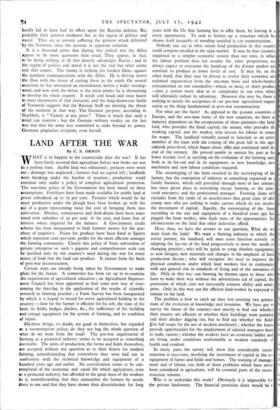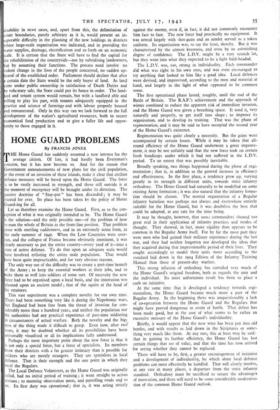LAND AFTER THE WAR
By C. S. ORWIN HAT is to happen to the countryside after the war? It has been freely asserted that agriculture before war broke out was in a parlous state. Arable land was exhausted ; pastui es were worn out ; drainage was neglected ; farmers had no capital left ; landlords were breaking under the burden of taxation ; production could continue only under a policy of complete agricultural protection. The war-time policy of the Government has been based on these assumptions. Fertilisers have been made available for arable land at prices subsidised up to 75 per cent. Pastures which would be far more productive under the plough have been broken up with the aid of a grant representing twice the cost of bringing them into cultivation. Ditches, watercourses and field-drains have been reno- vated with subsidies of 50 per cent, of the cost, and loans free of interest where required for the balance. A Government credit scheme has been inaugurated to lend farmers money for the pur- chase of requisites. Prices for produce have been fixed at figures which represent cent.-per-cent. profits for the more efficient amongst the farming community. Clearly this policy of State subvention of private enterprise on such a gigantic and comprehensive scale can be justified only by the country's need during the war for every ounce of food that the land can produce. It cannot form the basis of post-war reconstruction.
Certain steps are already being taken by Government to make plans for the future. A committee has been set up to re-examine the organisation of agricultural education ; an Agricultural Improve- ment Council has been appointed to find some new way of over- coming the time-lag in the application of the results of scientific research to farming practice ; a Farm Survey has been inaugurated by which it is hoped to record for every agricultural holding in the country :—how far the farmer is efficient for his job, the state of his land, its fields, hedges, ditches, &c., the sufficiency of his building ind cottage equipment for his system of farming, and its condition of repair.
All. these things, ro doubt, are good in themselves, but regarded as a reconstruction policy, do they not beg the whole question of what do we want from the land? The pre-war organisation of farming as a protected industry seems to be accepted as something inevitable. The units of production, the farms and fields themselves, are accepted without any question as to their fitness for modern farming, notwithstanding that everywhere they were laid out in conformity with the technical knowledge and equipment of a
hundred years ago and earlier. No consideration seems to be con- templated of the economic and social life which agriculture, even as a protected industry, has afforded to the great mass of the workers in it, notwithstanding that they outnumber the farmers by nearly three to one and that they have shown their dissatisfaction for long years with the life that farming has to offer them, by leaving it a every opportunity. To seek to bolster up a structure which ha shown itself incapable of standing unaided is Lot reconstruction.
Nobody can say to what extent food production in this country could compete unaided in the open market. It may be that countries organised on a simpler economic system than our own, in which the labour problem does not assume the same proportions, can always expect to overcome the handicap of the distant market and continue to produce at lower levels of cost. It may be, on the ether hand, that they may be driven to evolve their economic and technical organisation from the one-man basis and whole-hearted concentration on one commodity—wheat, or meat, or dairy produce —into a system more akin in its complexity to our own, which will ultimately reduce its advantage. However this may be, there is nothing to justify the acceptance of cur pre-war agricultural organi sation as the thing fundamental to post-war reconstruction.
For what are the facts? As opposed to the peasant countries o Europe, and the one-man farms of the new countries, we have an industry dependent on the co-operation of three partners—the land- lord, who provides the fixed capital; the tenant, who provides the working capital; and the worker, who invests his labour in return for wages. The landlord virtually ceased tc function as an active member of the team with the coming of the great fall in the agri- cultural price-level, which began about r88o and continued until the end of the century. He proved unable to sustain his part at his lower income level in carrying on the evolution of the farming unit, both in its lay-out and in its equipment, as new knowledge, new machinery and new labour conditions required.
The stereotyping of the farm resulted in the stereotyping of the farmer, but the conception of industry as something organised as a family business, which still prevailed through most of last century, has since given place in everything except farming, to the joint- stock enterprise and. the professional manager. Farming alone still excludes from the ranks of its practitioners that great class of able young men who are seeking to make careers which do not involve the investment of capital. Equally, the stereotyping of the farm according to the size and equipment of a hundred years ago has pegged the farm worker, who finds none of the opportunities for advancement on the land that other industries afford.
Here, then, we have the answer to our question, What do we want from the land? We want a farming industry in which the senior partner, the landlord, will once more function actively in adapting the lay-out of the land progressively to meet the needs of changing practice ; who will be quick to scrap obsolete equipment, as new designs, new materials and changes in the emphasis of food production dictate ; who will recognise the need to improve the physical conditicns under which land workers live in conformity with any general rise in standards of living and of the amenities of life. Only in this way can farming be thrown open to those who have to make their way without the adventitious aid of capital, the possession of which does not necessarily connote ability and enter- prise. Only in this way can the efficient land-worker be expected to remain on the land.
The problem is how to catch up time lost covering two genera- tions of the evolution of knowledge and invention. We have got to survey the farms of the country—not merely to find out whether their tenants are efficient or whether their buildings want painting and their ditches digging out, but to find out whether the fields give full scope for the use of modern machinery ; whether the farms provide opportunities for the employment of salaried managers keen to make careers ; whether the workers have an economic ladder and are living under conditions conformable to modern standards of health and comfort.
In many parts the survey wilt show that considerable recon- struction is necessary, involving the investment of capital in the re- equipment of farms and fields and homes. The training of manage- ment and of labour, too, both of them problems which have never been considered in agriculture, will be essential parts of the recon- struction scheme.
Who is to undertake this work? Obviously it is impossible for the private landowner. The financial provision alone would be a isability in most cases, and, apart from this, the delimitation of state boundaries, purely arbitrary as it is, would present an in- uperable difficulty in the planning of the new holdings in districts here large-scale organisation was indicated, and in providing the .ater supplies, drainage, electrification and so forth on an economic cale. It is certain that the State will have to find the capital for e rehabilitation of the countryside—not by subsidising landowners, ut by assuming their functions. The process need involve no iolent change in the lives of the people concerned, no sudden up-. eaval of the established order. Parliament should declare that after certain date the State would be the only buyer of land. As land ame under public ownership in satisfaction of Death Duties and y voluatary sale, the State could put its house in order. The land- ord and tenant system would remain, but with a landlord able and illing to play his part, with tenants adequately equipped in the ractice and science of farming; and with labour properly housed nd remunerated. Only in this way can we look forward to the full evelopment of the nation's agricultural resources, both to secure conomical food production and to give a fuller life and oppor- unity to those engaged in it.



























 Previous page
Previous page